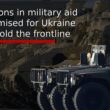Prime Minister of Estonia Kaja Kallas said at the meeting of leaders of state and government of the European Union in Prague:
“We need a long-term solution to get rid of Russia’s gas addiction and accelerate investments in renewable energy. In order to get the situation under control quickly and to reduce energy prices for consumers, we need temporary measures.”
She also noted that Russia uses energy as a weapon against Europe and has significantly reduced gas supplies. In her opinion, for the plenary meeting in October, the European Commission should alleviate the burden of the energy prices and ensure the equipment security in EU countries.

RIght: gas leak that is polluting the Baltic Sea environment due to pipeline detonation.
By now everyone in the whole world knows that Russia is the main supplier of natural gas to Europe. Russia began to use this circumstance as a vulnerability against the backdrop of the Russian-Ukrainian war. It started blackmailing Europe by stopping supplies due to EU support of Ukraine.
The situation has worsened on September 26, when two branches of the Russian Nord Stream pipeline were damaged synchronously at three locations. Swedish investigators determined that the explosions were caused by detonation. They concluded that the evidence points to a deliberate act.
Russia immediately started accusing Europe of sabotage, in particular based on the fact that the substitute underwater gas pipeline from Norway to Poland in the same section of the Baltic Sea had to be opened. However, a broader background lets everyone see the big picture:
- This happened just before the heating season started in Europe. It gives Russia a justification to completely stop the gas supply.
- The Kremlin is franticly looking for additional leverage to stop the successful Ukrainian counteroffensive where Ukraine achieved a tactically favorable position. Russia doesn’t have the time to regroup unless the Europeans put pressure on Ukraine compelling it to halt the counteroffensive.
The energy security issues become so acute also in connection with the situation with the largest proven gas field in Europe in the Dutch province of Groningen. The Dutch government made the decision to stop extracting gas due to the destruction of thousands of houses damaged as a result of decades of extraction, which had resulted in tiny earthquakes. They have promised to shut down the field by 2024 and have reduced gas flows to a minimum.
The International Energy Agency warned in its quarterly gas report published on October 3:
“The complete shutdown of Russian pipeline gas supplies to the European Union cannot be excluded ahead of the 2022/23 heating season – when the European gas market is at its most vulnerable.”
Simultaneously IEA informs that the EU’s currently underground gas reserve levels are at about 88% of capacity, which is higher than its target of 80%. According to the IEA, household energy-saving measures, such as lowering boiler temperatures and thermostats by 1 degree Celsius, would increase Europe’s gas storage levels.
It should be noted that the White House predicted a possible termination of gas supplies from Russia. That is why has ruled out any ban or restrictions on natural gas exports this winter to assist alleviate energy shortages in Europe. Following Russia’s invasion of Ukraine in March, U.S. President Joe Biden pledged to send 15 billion cubic meters more of liquefied natural gas (LNG) to Europe, and he has already surpassed that target.

According to Bloomberg, Europe will likely have enough fuel for power generation this winter to balance supply from Russia thanks to its rampant purchases of LNG (liquefied natural gas). Europe may import about 40% more LNG during the upcoming winter than it did the year before, while it may also increase purchases by roughly 14% next summer to make up for lost inventories. Those supplies are sufficient to cover a total halt in Russian pipeline flows in addition to demand destruction brought on by rising energy prices, Bloomberg said.
Hence, it looks like the heating season has been relatively difficult, but it’s safe to say that Europeans will still be warm this winter. But one important lesson emerged from past missteps of European policymakers. But one should no longer rely on such an unreliable supplier as Russia in the future.
Unfortunately, Europe had to experience a ‘cold shower’ because of Russia’s gas supply blackmailing, but the situation will help Europe make a renewed emphasis on a strategic diversification of energy sources.




